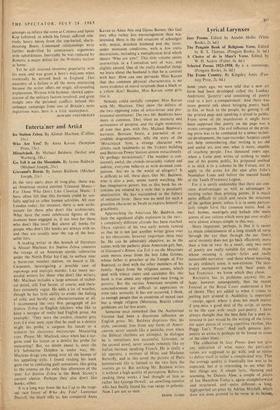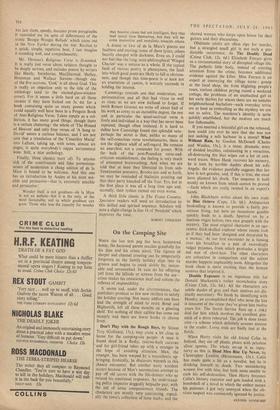Lyrical Larynxes
The Penguin Book of Religious Verse. Edited SOME years ago, we were told that a new art form had been developed called (by Lindsay Anderson) 'jazzetry' and consisting of poetry read to a jazz accompaniment. And there was more general talk about bringing poetry back to life, or back to the people, by getting it of the printed page and speaking it aloud in public. From some of the manifestoes it might have been supposed that poetry on the page was a recent corruption. The evil influence of the print- ing press was to be combated by a newer techni- cal development, the tape-recorder. Sceptics could not help remembering that writing is an old and useful art, and one, what is more, capable of reaching people. Two thousand years ago, when a Latin poet writes of wishing to make one of his poems public, his proposed method is to stick it to a column in the Forum, not to apply to the arena for the spot after Juba's Numidian Lions and before the massed bands of the Tenth (Fretensis) Legion.
For it is surely undeniable that there are con- crete disadvantages as well as advantages in reciting rather than printing poems. It is much more difficult to catch and retain the structure of the spoken poem, unless it is in some particu- larly simple form like common metre. And. in fact, hymns, madrigals and ballads (the main poems of our culture which were put over orally) were almost always simple in this way.
More important, perhaps, is that it is easier to retain consciousness of a long stretch of verse through the eye than through the ear. One's aural memory does not go back effectively more than a line or two. As a result, only two sorts of poetry are really suitable for recital: those whose meaning is simple—lyrics and easily memorable narrative--and those whose meaning. in any ordinary sense, is non-existent. The jazz- poetry movement started with 'beat' poets in San Francisco: we know which they chose.
Recitative has its problems anyway (let us hope, however unsanguinely, that the recent Festival at the Royal Court understood a few of them). They are added to when it comes to putting' jazz around it. Audibility is important —except. again. where it does not much matter if you miss a good deal of the script, as seems to be the case with much jazz-poetry. I have always thought that the best field for a poet in- terested in jazz would be the writing of the lyrics for quiet pieces of strong repetitive rhythm, like Peggy Lee's 'Fever.' And such genuine jazz- poetry as exists is perhaps to he found in some of the older blues.
The collection in Jazz Poems does not give any indication of what music the particular verses are supposed to go with, and so seems to defeat itself in rather a complicated way. That the average quality is frantically low was to be expected. but it is interesting to see what the best things are. A simple lyric, rhyming and scanning, by Dannie Abse, a couple of pieces of Ian Hamilton Finlay's, again straightforward and structured, and--quite different-7a long. high-spirited set-piece by Adrian Mitchell, which does not even pretend to be verse in its laiout. but just short, speedy, staccato prose paragraphs. It reminded me (in spite of differences) of the ironic 'Boogie Woogie Ballads' which came out in the New Yorker during the war. Recited to a quick, simple, repetitive beat, I can imagine it sounding well, and comprehensibly.
Mr. Thomas's Religious Verse is ill-named. It is really just verse about subjects thought to be deeply serious, and includes poems by writers like Hardy, Swinburne, MacDiarmid, Shelley, Housman and Wallace Stevens--though one of the five sections, 'God,' is all about God. This is really an objection only to the title of the anthology (and to the stained-glass-window cover). For it seems a little hard on all those curates if they have forked out 3s. 6d. for a book containing quite so many poems which could equally well have been in a Penguin Book of Anti-Religious Verse. Taken simply as a col- lection, it has many good things, though there is a certain cluttering: the whole of 'The Hound of Heaven' and only four verses of 'A Song to David' seems a curious balance, and I am not sure that a translation of the 'Cimetiere Marin' into Lallans, taking up, with notes, almost six pages, is quite everybody's cuppa sacramental wine. Still, a nice anthology.
Finally, three classics (sort of). To anyone sick of the contrivances and fake portentous- nesses of modernism a cheap edition of de la Mare is bound to be welcome. And this one has an introduction by Auden at his most sen- sible and persuasive—that is, extremely sensible and persuasive:
Wonder itself is not goodness—de la Mare is not an msthete—but it is the only, or the most favourable, soil in which goodness can grow. Those who lose the capacity for wonder may become clever but not intelligent, they may lead moral lives themselves, but they will be- come insensitive and moralistic towards others.
A dozen or two of de la Mare's poems are faultless and moving, some of them lyrics, others heavily charged with darkness. Even so, I could not feel that the long, semi-philosophical 'Winged Chariot' was a success as a whole. If the typical fault of vicious poetry is phoneyness, the fault into which good poets are likely to fall is obvious- ness, and though this time-poem is at least not an eructation of cantos, it scarcely succeeds in holding the interest.
Cummings reminds one that modernism, ex- perimentalism and all that had virtue as well as vices, as we are now inclined to forget. If (with Robert Graves) we write off about half of his work as corny to an incredible degree, the rest and in particular the quasi-satirical verse is lively and individual in a way that has never been repeated, though often imitated. It is hard to define how Cummings found this splendid vein: perhaps the secret is that, unlike so many of the self-conscious verse revolutionaries, there is not the slightest whiff of self-regard. He remains an anarchist, not a contender for power. With the bulk of the post-Poundian verse-and- criticism establishment, the feeling is very much of attempted brainwashing. And when we are told that at least they liberated us from sub- Tennysonian poetastry, Brooke-ism and so forth, we may be reminded of Stalinists pointing out that their party knocked off the Tsar. Yes, but in the first place it was all a long time ago and, secondly, their system turned out even worse.
A third little classic is The Evans Country. Spectator readers will need no introduction to this skilled and spirited sequence. Scholars will note a slight change in line 18 of 'Pendydd' which improves the tone.
ROBERT CONQUEST







































 Previous page
Previous page